

Learning theories timeline: key ideas from educational psychology. Let's lose the deficit language about online education. Reading the national press at the moment you might think that universities had just performed the last rites over centuries of in-person and on-campus teaching.
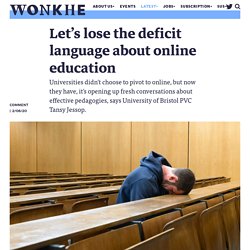
The argument being pedalled by journalists whose experience of lectures was clearly more inspirational than mine, is simplistic and misleading. It suggests that a curriculum without live lectures equates to the end of all in-person teaching, as if practicals, laboratories, seminars, and tutorials do not count. Headline catching it may be; true it is not. There are good arguments why universities are putting lectures online.
Any university which has a vague interest in keeping the R rate down and being public health spirited would not wish to cram 400 students into a large airless lecture mimicking a static version of the Diamond Princess, but with younger passengers. Kill the sacred lecture cow. HIP tables. Learning Outcomes: Constructive Alignment. At this point, it may be helpful have a better understanding of constructive alignment as a curriculum design process.
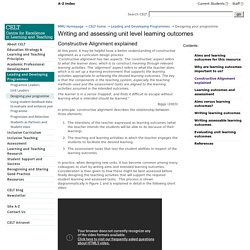
"Constructive alignment has two aspects. The 'constructive' aspect refers to what the learner does, which is to construct meaning through relevant learning activities. The 'alignment' aspect refers to what the teacher does, which is to set up a learning environment that supports the learning activities appropriate to achieving the desired learning outcomes. The key is that the components in the teaching system, especially the teaching methods used and the assessment tasks are aligned to the learning activities assumed in the intended outcomes.
Fellowship Category Tool. The Fellowship Category Tool has been designed to assist you in selecting the category of Fellowship that is the closest match to your current practice.
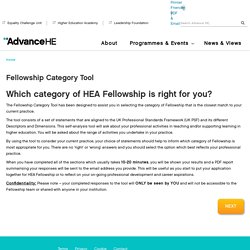
The tool consists of a set of statements that are aligned to the UK Professional Standards Framework (UK PSF) and its different Descriptors and Dimensions. This self-analysis tool will ask about your professional activities in teaching and/or supporting learning in higher education. You will be asked about the range of activities you undertake in your practice. By using the tool to consider your current practice, your choice of statements should help to inform which category of Fellowship is most appropriate for you.
There are no ‘right’ or ‘wrong’ answers and you should select the option which best reflects your professional practice. When you have completed all of the sections which usually takes 10-20 minutes, you will be shown your results and a PDF report summarising your responses will be sent to the email address you provide. The Quality Assurance Agency for Higher Education (QAA) Home. Digitalstorytellingsynthesis / Digital storytelling in higher education. McLellan (2006: 73), while recognising that digital storytelling has applications in a range of disciplines, prioritises its use for personal stories, digital story archives, memorial stories, avocational stories, educational stories and stories in medicine and health.
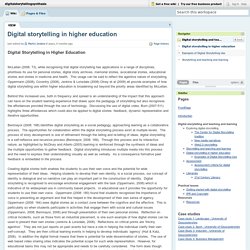
This usage can be said to reflect the agentive nature of storytelling. Oppermann (2008), Coventry (2008), Jenkins & Lonsdale (2008) Olney et al (2009) all provide examples of how digital storytelling use within higher education is broadening out beyond the priority areas identified by McLellan. Behind this increased use, both in frequency and spread is an understanding of the impact that this approach can have on the student learning experience that draws upon the pedagogy of storytelling but also recognises the affordances provided through the use of technology. Online Ecosystem Maps. International Journal for Students as Partners. Vision The International Journal for Students as Partners (IJSaP) is a new journal about learning and teaching together in higher education.
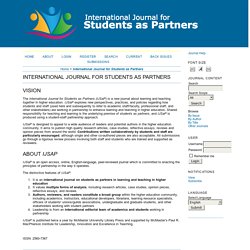
IJSaP explores new perspectives, practices, and policies regarding how students and staff (used here and subsequently to refer to academic staff/faculty, professional staff, and other stakeholders) are working in partnership to enhance learning and teaching in higher education. Shared responsibility for teaching and learning is the underlying premise of students as partners, and IJSaP is produced using a student-staff partnership approach. IJSaP is designed to appeal to a wide audience of readers and potential authors in the higher education community. It aims to publish high quality research articles, case studies, reflective essays, reviews and opinion pieces from around the world. Pub7101. Higher education: policy, people and politics. Teaching & Learning Inquiry. The 10 fundamentals of teaching online for faculty and instructors sept 2016.
The Open Textbook Project provides flexible and affordable access to higher education resources. Subtitle: Guidelines for designing teaching and learning Author: A.W.
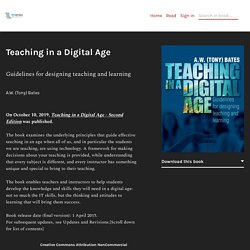
(Tony) Bates Book Description: On October 10, 2019, Teaching in a Digital Age - Second Edition was published.The book examines the underlying principles that guide effective teaching in an age when all of us, and in particular the students we are teaching, are using technology. A framework for making decisions about your teaching is provided, while understanding that every subject is different, and every instructor has something unique and special to bring to their teaching.The book enables teachers and instructors to help students develop the knowledge and skills they will need in a digital age: not so much the IT skills, but the thinking and attitudes to learning that will bring them success. Book release date (final version): 1 April 2015. License: Creative Commons Attribution NonCommercial.
A SoTL Primer. How many times did you introduce SoTL to someone new in the last year, and what did that introduction look like: a definition, a description, a metaphor, a citation, a workshop, a book, a website?
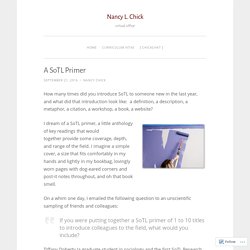
I dream of a SoTL primer, a little anthology of key readings that would together provide some coverage, depth, and range of the field. I imagine a simple cover, a size that fits comfortably in my hands and lightly in my bookbag, lovingly worn pages with dog-eared corners and post-it notes throughout, and oh that book smell. On a whim one day, I emailed the following question to an unscientific sampling of friends and colleagues: If you were putting together a SoTL primer of 1 to 10 titles to introduce colleagues to the field, what would you include?
I’ll put the full list on my SoTL Guide once it’s ready, but for now, here are a few highlights: Teaching & Learning Inquiry. Professional Development - Organisation Development listings and Bookings. Coventry University - Staff Guide to Student Support. Assessment-2020 - Seven Propositions for Assessment. SEEC Credit Level Descriptors 2010. Frameworks for Higher Education Qualifications - England, Wales and Northern Ireland. ASKe - Centre for Excellence in Teaching and Learning - Oxford Brookes University* The work of the centre has been organised into 4 strands of activity, click on them to find out more.
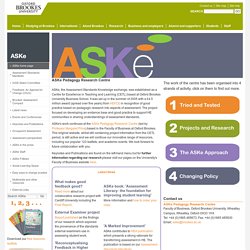
Contact us ASKe Pedagogy Research Centre Faculty of Business, Oxford Brookes University, Wheatley Campus, Wheatley, Oxford OX33 1HX Tel: +44 (0)1865 485673, Fax: +44 (0)1865 485830 Email: aske@brookes.ac.uk ASKe Pedagogy Research Centre. Quality Code for Higher Education. David Baume - Writing and Using Good Learning Outcomes. Higher Education Academy. Learning and Teaching Home. What makes a good lecturer: the student perspective. UK Professional Standards Framework (UKPSF) INSPIRING TEACHING TRANSFORMING LEARNING. Coventry University Assessment Strategy 2015-21. Coventry University Group Education Strategy 2015-21. Academic Development Web Site. Ketteridge & Fry (3rd ed) Handbook for Teaching and Learning in Higher Education Enhancing academic and Practice.
Home - HESA - Higher Education Statistics Agency. The National Student Survey 2015. Times Higher Education. Guardian Higher Education.